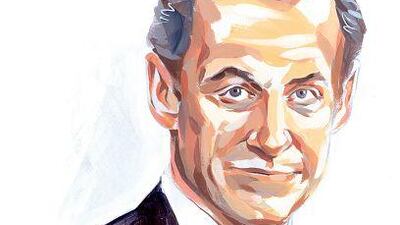Nicolas Sarkozy won general plaudits from the chancelleries of Europe for his performance as rotating president of the European Union in the second half of last year, but no encomium was quite so respectful as the one he gave himself. It turned out that he had not just shaped the destiny of Europe, but saved the world. Musing upon his hectic six-month term as he prepared to hand over the presidency to the Czech Republic, he reflected on how he had "enabled the world to avoid sliding down the slope of 'everyone for themselves', which would have been fatal".
As well as taking credit for organising the emergency economic summit of the G20 nations in Washington in November, Mr Sarkozy gave early warning that he would impose his views on a "new world order for capitalism" at a further meeting in London in March. Meanwhile, there was to be no easing up on his pet project, the new Union for the Mediterranean, which he launched last July. It groups all 27 EU states as well as the bloc's neighbours in the Balkans, north Africa and the Middle East, including Israel.
No shrinking violet, Nicolas Sarkozy; no lights are hidden under bushels these days in the Elysée Palace. Anyone observing Mr Sarkozy's shuttle diplomacy in Israel and the Palestinian Territories in the past few days could be forgiven for thinking France still holds the presidency. As European governments struggled to find a common voice, he flew to the region, urging restraint, demanding ceasefires, getting himself photographed.
His diplomatic offensive in the Middle East coincided with a visit from an EU delegation led by Karel Schwarzenberg, the Czech foreign minister, Javier Solana, the EU's foreign policy chief, and Benita Ferrero-Waldner, external relations commissioner. EU officials were left to ponder how seriously Mr Solana and Ms Ferrero-Waldner would be taken by the Israelis or the Palestinians if they were constantly tripping over Mr Sarkozy as he staged his photo opportunities.
The EU presidency will be held in 2009 by the Czech Republic and Sweden, two minnow states on the periphery of the Union, which offends Mr Sarkozy who, in the tradition of French leaders, tends to see the EU principally as a cosy Franco-German club. "Of course I will be taking initiatives," he told the European Parliament last month, after it reviewed his oversight of the global credit crunch and his energetic diplomatic engagement after Russia's invasion of Georgia last year.
"He has one fear," the newspaper Le Monde predicted at the time. "Becoming again the president of an average country, disarmed in the face of recession and confronted by soaring unemployment." It is easy to sympathise with Mr Sarkozy's current plight. At the best of times, domestic French politics are unspeakably dull. The president can scarcely conceal his disdain for the ministers he has to deal with as his government tinkers with judicial reform and other turgid policy matters. Who wants to be leader of a single European state, mired like the rest of the continent in economic crisis, when there is a whole world out there, waiting to be saved?
For many years, Sarko - as he is known to admirers and enemies alike - has puzzled and confounded those who try to define him. Instinctively a man of the Right, he is no economic liberal, and is ever anxious to project French power and national economic interest. He has been accused, perhaps unfairly but persistently, of calling immigrant youths in the slums around Paris "scum". Confronted by a hostile member of the public at an agricultural show last year, Mr Sarkozy swore and called him, depending on your choice of translation, a "stupid jerk".

